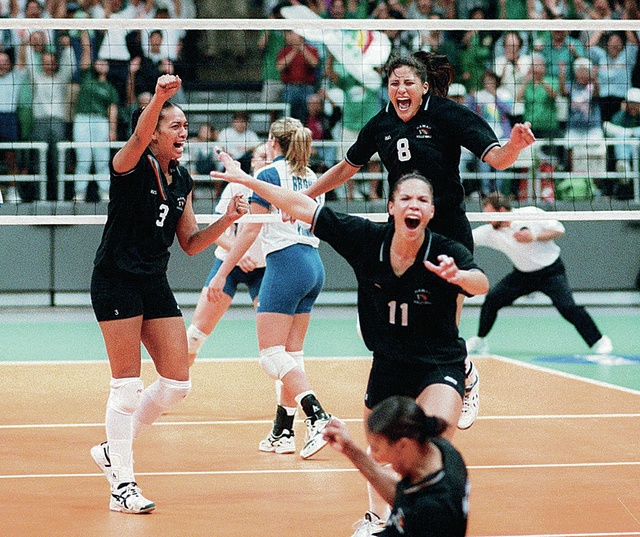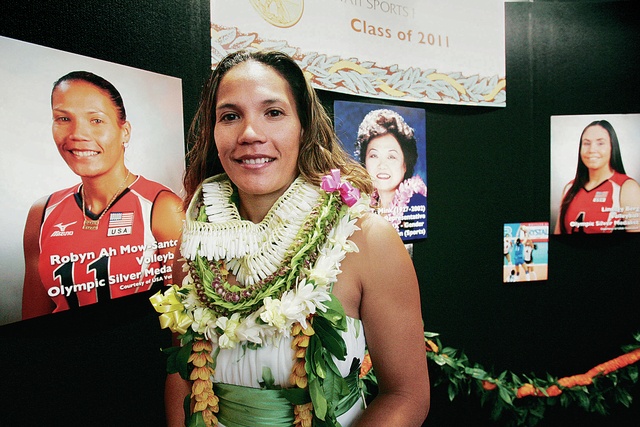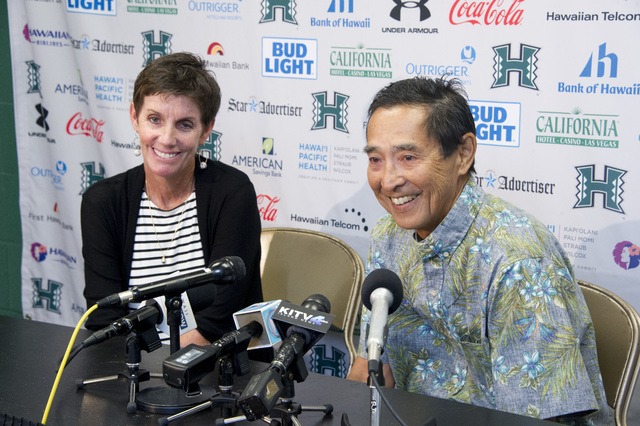Dave Shoji has a regret … or two … or three … as he moves on with his life after 42 seasons as the Rainbow Wahine volleyball coach. He would have liked to have added a few more national championship banners to the four that hang from the rafters of the Stan Sheriff Center.
“But that’s the way sports are,” Shoji said. “You don’t always win as many as you want to. But looking back, I think it’s been a good run.”
His 42 seasons in Manoa started as a part-time job, one where he would also double as the men’s coach. It officially ended on Monday when he announced his retirement while giving his blessing to his successor, one of his most-decorated former players in All-American Robyn Ah Mow-Santos, a three-time U.S. Olympic team setter.
“I’ll be here for her if she wants me to be involved,” Shoji said of the third coach in the 44-year history of the program. “I’m not moving. I intend to be at all the games.
“It absolutely makes me feel at ease. I know Robyn is ready for the challenge. I’ve seen her grow as a player and as a coach. I’m happy for Robyn and feel really good about the decision.”
The tougher one for Shoji was to retire. He was diagnosed with prostate cancer just prior to the NCAA tournament in December, going public on Dec. 12, a little more than a week after his 70th birthday and after what would be his last match as the Wahine coach.
Shoji was accompanied at the press conference by his wife of 30 years, Mary Tennefos Shoji, a former Wahine basketball player. He said that the choice to retire came after much discussion with his family, including daughter Cobey Shoji Hutzler and sons Kawika and Erik.
Shoji is in the middle of his second round of radiation and “I feel good,” he said. “I’ll be done in March and then it’s up to the doctors.
“This was very difficult. I love the sport. I love the game. I love my job. But God was just pulling me toward retirement. There was something telling me to do that. Day by day, it just kind of evolved into, ‘Hey, let’s just do this.’”
While health wasn’t an issue in the decision by two of Shoji’s contemporaries, both Andy Banachowski and John Dunning went through the same process before leaving successful coaching careers. Banachowski retired in 2010 after 39 seasons and six titles at UCLA and as the all-time wins leader with 1,106 (Shoji would pass him in 2013); Dunning retired after Stanford won the NCAA championship last December.
“I’m happy that Dave is taking some time for himself,” said Banachowski, who was watching a replay of Shoji’s news conference online during a call from his Los Angeles home. “I think that (Ah Mow-Santos) is a very good, logical hire. She has accomplished so much and will be able to come in and continue the program that Dave has built.”
“I’m grateful for Dave for how he treated me, he’s been a good friend and a great coach,” said Dunning, who has been vacationing on Maui for the past two weeks. “He’s clearly one of the best game coaches I’ve ever coached against. He’s amazing and has been amazingly successful for so long. I’m in awe of what he’s done.”
Shoji never had a losing season in his 42 years, the closest being 15-12 in the injury-plagued 1992 campaign. Hawaii led the country in attendance from 1995 until 2014, when it was surpassed by Nebraska.
“What Dave has done is prove that volleyball can attract attendance that rivals men’s basketball,” Arizona coach Dave Rubio said. “When women’s volleyball started, the powers were Hawaii, Long Beach State, Pacific, UC Santa Barbara, UCLA, USC. Of all those major programs from back then, the one school that has remained elite and in the conversation for a national title every year is Hawaii. And that is because of Dave.
“No place in the country has fans who understand and are so passionate about the sport. There’s a real emotional involvement with the Wahine.”
Added Russ Rose, who has since passed Shoji as the all-time wins leader: Dave has impacted a lot of us (coaches). His impact has been on the mainland, not just Hawaii. Only a few people have accomplished that in our sport.”
If there is one other regret, it comes not from Shoji but from one of his fellow coaches — and arguably his biggest rival of late, Long Beach State coach Brian Gimmillaro.
“I wish we had all known last year was going to be his last,” Gimmillaro said. “I’m sorry we didn’t have a season to celebrate him. We would have loved to have done it at Long Beach, just as other places would have.
“Anyone who has been around that long with the success that he has deserves a proper sendoff. We all want to wish him the best.”
Shoji’s last victory came in five sets against USC, in an epic NCAA first-round battle against long-time rival Mick Haley. Haley’s Texas team defeated the defending champion Wahine in 1988.
“It was great competition every time against Dave,” Haley said. “If you didn’t win, it drove you nuts. If you won, you took great satisfaction.
“And every time you played at Hawaii, you didn’t have trouble getting up for the match. It’s always special, always a challenge, and you felt you grew from that experience.”
There has been no announcement from UH about a recognition event for Shoji. He had long said he wanted to retire quietly and not have a “farewell tour.”
DAVE SHOJI TIMELINE
Oct. 29, 1975
First win in his first match as head coach of Rainbow Wahine. Defeated UC Riverside on the road, 15-17, 15-6, 15-13, 15-11.
Nov. 3, 1979
Wins his 100th match in a sweep of Southern California, 15-4, 15-11 at the UCLA/NIVT tournament in Los Angeles.
Nov. 11, 1987
The Wahine defeat defending national champion Utah State in a packed Klum Gym, 13-15, 6-15, 15-7, 15-10, 15-7.
Dec. 8, 1979
Wins the University of Hawaii’s first national championship. UH comes back from two sets down to defeat defending national champion Utah State in Carbondale, Ill., 8-15, 7-15, 15-9, 16-14, 15-12.
Oct. 29, 1982
Earns his 200th win by beating UCLA 15-17, 15-9, 15-13, 17-15, in the Wendy’s Classic tournament in Stockton, Calif.
Dec. 19, 1982
Leads the Wahine to their first NCAA championship with a come-from-behind win in five sets, defeating Southern California, 14-16, 9-15, 15-13, 15-10, 15-12.
Dec. 19, 1983
Guides the Wahine to their second straight NCAA title, sweeping UCLA 15-13, 15-4, 15-10 in Lexington, Ky.
Oct. 10, 1985
Captures his 300th career win with a three-set victory over Pepperdine, 15-13, 9-15, 15-12, at the UCLA/NIVT tournament in Los Angeles.
Dec. 11, 1987
After falling to Pacific in the NCAA tournament in 1985 and ’86, the Wahine break through, sweeping Pacific in the NCAA Regional Finals in Klum Gym, 15-11, 15-9, 15-12.
Dec. 19, 1987
Helps the Wahine capture their third NCAA and fourth national title by defeating Stanford 15-10, 15-10, 9-15, 15-1.
Oct. 22, 1988
Wins his 400th match with a sweep at Colorado State, 16-14, 15-2, 15-10.
Sept. 17, 1992
Gets win No. 500 with a victory over San Jose State, 12-15, 15-7, 15-3, 15-7.
Oct. 21, 1994
Shoji and the Wahine play their first match in the Stan Sheriff Center in front of a sellout crowd of 10,300, defeating San Jose State 15-4, 12-15, 15-2, 15-6. It was also the first event ever in the SSC.
Sept. 21, 1996
Captures his 600th victory with a sweep of California, 15-11, 15-7, 15-7.
Dec. 13, 1996
Beats Brigham Young 15-10, 15-6, 15-6 in an NCAA Regional Final at Stan Sheriff Center to advance to the NCAA semifinals in Cleveland.
Dec. 19, 1996
Guides the Wahine in a sweep of Florida to advance to the NCAA championship match in Cleveland, 15-11, 15-8, 15-9.
Nov. 28, 1998
The Wahine and Brigham Young play in the longest match in NCAA history — three hours and 38 minutes — in the WAC championship in Las Vegas. The Wahine won 15-12, 21-19, 13-15, 16-18, 24-22.
Oct. 30, 1999
Earns 700th victory with a 15-3, 15-5, 15-10 sweep at Fresno State.
Dec. 7, 2000
Helps the Wahine defeat Long Beach State in the NCAA Regionals in Honolulu, 11-15, 15-13, 15-9, 12-15, 15-6.
Nov. 27, 2002
Earns his 800th career win with a sweep at Utah in UH’s final regular-season match of the 2002, 31-29, 30-16, 30-18.
Dec. 14, 2002
Guides the Wahine past Nebraska in Lincoln, Neb., in the NCAA Regional Finals, 30-25, 25-30, 30-27, 30-21, to advance to the NCAA semifinals in New Orleans.
Dec. 3, 2005
The No. 2-ranked Wahine defeat No. 4-ranked Texas in the second round of the NCAA tournament in Austin, Texas, 19-30, 30-18, 30-26, 30-20.
Sept. 2, 2006
Captures his 900th career win with a sweep of Colorado, 32-30, 30-23, 30-20.
Oct. 17, 2009
Earns his 1,000th career victory with a win over New Mexico State, 25-13, 22-25, 25-21, 25-8.
Dec. 12, 2009
Coaches the Wahine to a sweep of Michigan, 25-23, 25-19, 25-18, in the NCAA Regional Finals in Stanford, Calif., to advance to the NCAA semifinals in Tampa, Fla.
Nov. 17, 2012
Gets his 1,100th win at UC Davis, 25-17, 25-23, 25-17.
Sept. 6, 2013
Becomes the NCAA’s all-time winningest coach with his 1,107th victory, beating Santa Clara 25-23, 25-15, 23-25, 25-18, at the Stan Sheriff Center.
Dec. 11, 2015
The Wahine get their first win over Penn State, sweeping the Nittany Lions in the NCAA Regionals in Des Moines, Iowa, 25-22, 27-25, 25-16.
Nov. 17, 2016
Becomes just the second coach in NCAA history to win 1,200 matches. The victory comes against Cal Poly, 25-11, 26-24, 25-15.
Feb. 20, 2017
Announces his retirement after 42 years at the helm of the Rainbow Wahine volleyball program.
Source: University of Hawaii
Stephen Tsai contributed to this story.








